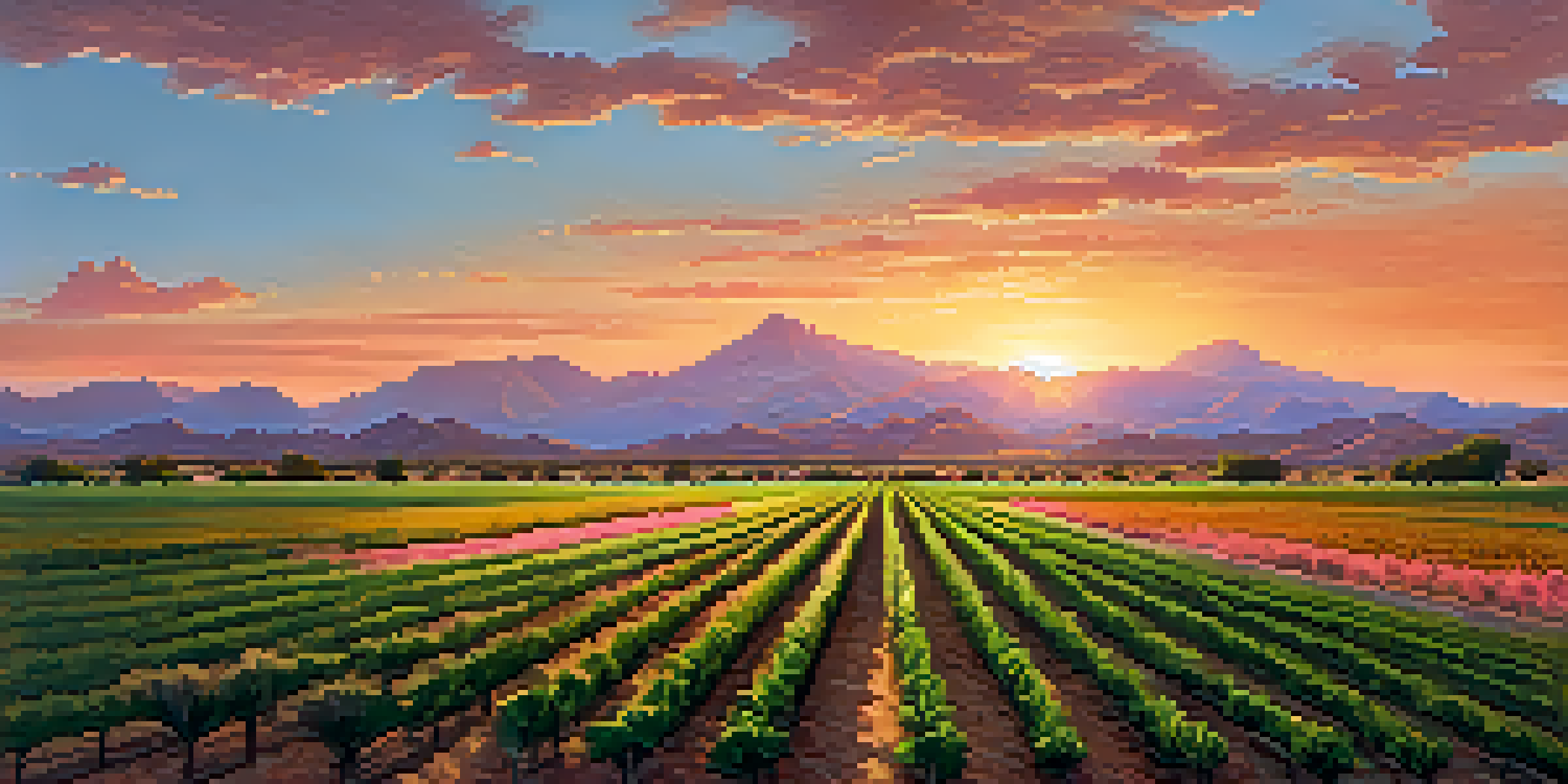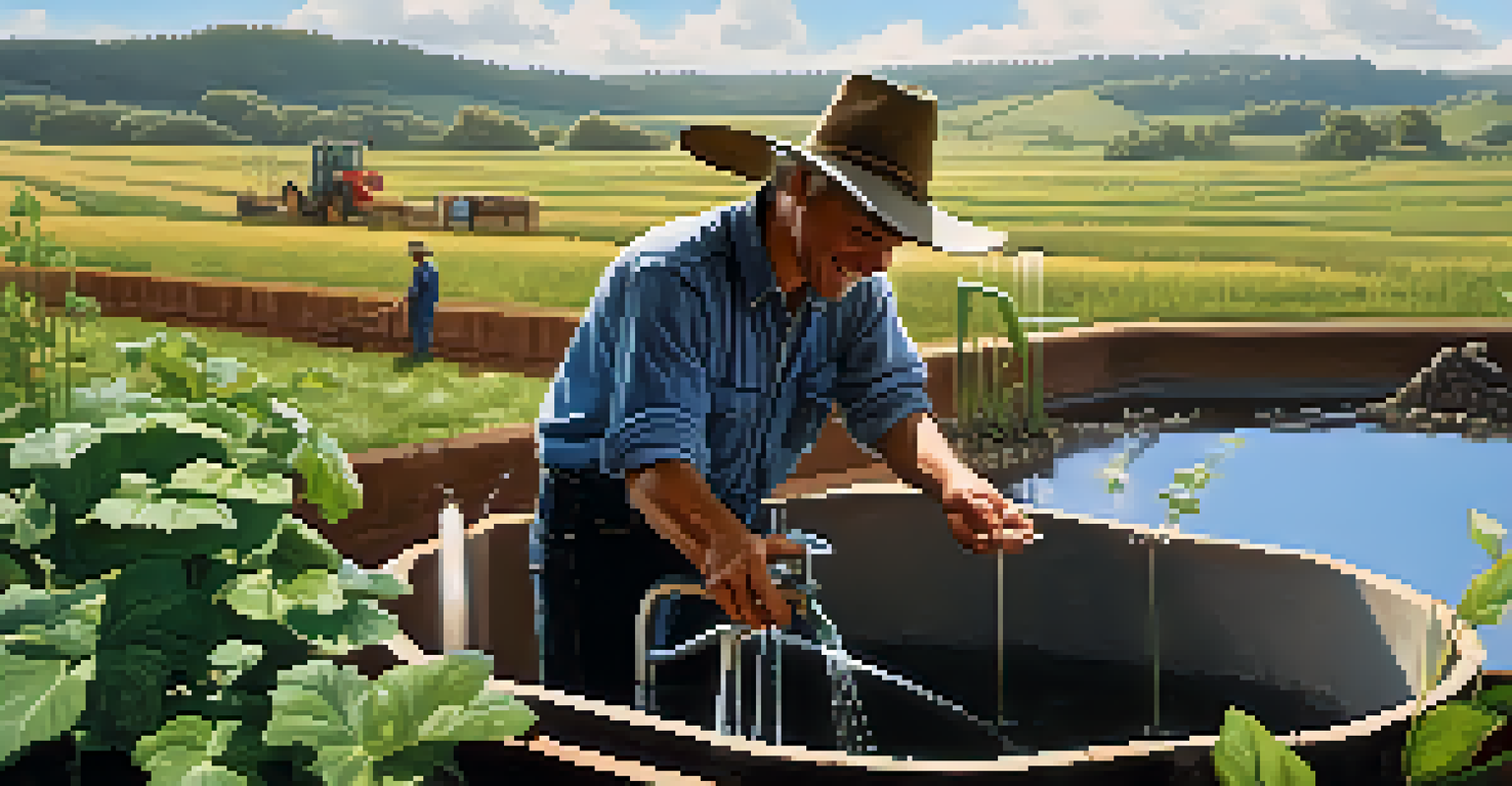Water Conservation Techniques Embraced by Arizona Farmers

Understanding Arizona's Water Challenges
Arizona's climate presents unique water challenges, including prolonged droughts and limited rainfall. Farmers in this region rely heavily on irrigation to sustain crops, making water conservation essential. As the population grows and agriculture demands increase, finding sustainable solutions becomes a necessity.
The greatest threat to our planet is the belief that someone else will save it.
The state's reliance on the Colorado River for water adds another layer of complexity. With ongoing discussions about water rights and allocations, farmers must adapt to ensure they have enough resources for their crops. The urgency to address these challenges is driving innovation and collaboration among agricultural communities.
Understanding these challenges helps frame the importance of the water conservation techniques that farmers are adopting. By embracing new technologies and methods, they not only protect their livelihoods but also contribute to the overall health of the environment.
Drip Irrigation: A Precision Approach
One of the most effective water conservation techniques embraced by Arizona farmers is drip irrigation. This system delivers water directly to the plant roots, minimizing evaporation and runoff. By using this targeted method, farmers can significantly reduce water usage while maintaining crop health.

Drip irrigation systems are designed to be efficient and customizable, allowing farmers to adjust water delivery based on specific crop needs. This precision not only conserves water but also enhances crop yields. It's like giving each plant a tailored drink, ensuring they get exactly what they need.
Water Conservation is Essential
Arizona's farmers face significant water challenges due to climate and population growth, making sustainable water practices crucial.
As more farmers invest in drip irrigation, the positive impacts are becoming evident. Not only does this technique help conserve water, but it also promotes better soil health and reduces the risk of disease, creating a win-win situation for both farmers and the environment.
Rainwater Harvesting: Nature's Gift
In a state known for its dry climate, rainwater harvesting is a brilliant strategy that Arizona farmers are increasingly adopting. By capturing rainfall from rooftops and other surfaces, farmers can store this precious resource for later use. This practice reduces dependence on groundwater and helps mitigate the effects of drought.
We won't have a society if we destroy the environment.
Farmers are installing tanks and reservoirs to collect rainwater, which can be used for irrigation during dry spells. This not only conserves water but also provides a sustainable solution to water scarcity. Imagine having a reservoir filled with rainwater, ready to nourish crops just when they need it most.
The community is seeing more farmers come together to share knowledge and resources for effective rainwater harvesting. As they work collaboratively, they are fostering a culture of sustainability that benefits everyone, ensuring that natural resources are preserved for future generations.
Soil Moisture Sensors: Smart Farming Technology
Embracing technology is another key strategy Arizona farmers are using for water conservation. Soil moisture sensors are becoming a staple on many farms, allowing farmers to monitor moisture levels in real-time. This data-driven approach helps them determine when and how much to irrigate, leading to more efficient water usage.
By using these sensors, farmers can avoid over-irrigation, which is not only wasteful but can also harm crop health. It's like having a personal weather station for your plants, ensuring they receive the right amount of water at the right time. This smart technology is revolutionizing traditional farming practices.
Innovative Techniques Boost Efficiency
Methods like drip irrigation, rainwater harvesting, and soil moisture sensors are transforming how farmers conserve water and enhance crop health.
As farmers adopt these advanced tools, the results are impressive. Increased efficiency in water usage not only helps in conserving this vital resource but also leads to healthier crops and improved harvests. It's a win for farmers, consumers, and the environment alike.
Crop Selection and Rotation: A Thoughtful Approach
Farmers in Arizona are also considering what crops they plant and how they rotate them as part of their water conservation efforts. Choosing drought-resistant crops can significantly reduce water needs. By selecting plants that thrive in arid conditions, farmers can cultivate healthy yields without overtaxing water resources.
Crop rotation plays a crucial role in maintaining soil health and water efficiency. By alternating crops, farmers can naturally replenish soil nutrients and reduce the risk of pests and diseases. This sustainable practice is akin to giving the land a breather, allowing it to recover while still producing food.
As farmers become more mindful of their crop choices, they not only conserve water but also contribute to a more resilient agricultural system. This holistic approach ensures that they can continue to grow food in a way that respects the environment and preserves resources for the future.
Community Collaboration for Water Efficiency
Another significant trend among Arizona farmers is the emphasis on community collaboration to enhance water conservation efforts. Farmers are coming together to share resources, knowledge, and innovative practices aimed at reducing water usage. This cooperative spirit fosters a sense of unity and collective responsibility.
By working together, farmers can implement larger irrigation projects that benefit multiple farms, maximizing water efficiency. They can also share insights on successful techniques, from technology to crop selection, learning from each other’s experiences. It's like creating a support network that strengthens the entire agricultural community.
Community Collaboration Matters
Farmers are uniting to share resources and knowledge, fostering collaborative efforts that significantly improve water efficiency in agriculture.
As these collaborations grow, the impact on water conservation becomes more pronounced. Not only does this enhance individual farm sustainability, but it also helps preserve vital water resources for everyone in the region, highlighting the importance of community in tackling shared challenges.
Education and Outreach: Spreading Awareness
Education plays a pivotal role in promoting water conservation techniques among Arizona farmers. Various organizations and agricultural institutions are providing training sessions and workshops focused on sustainable practices. These initiatives help farmers understand the importance of conserving water and equip them with practical skills.
Outreach programs also focus on educating the wider community about the significance of water conservation. By raising awareness, farmers can gain support for their initiatives and encourage more people to adopt sustainable practices. It's about creating a culture of conservation that extends beyond the fields.

As knowledge spreads, more farmers are empowered to take action, leading to a collective improvement in water management. This educational component ensures that water conservation techniques are not just individual efforts but part of a larger movement towards sustainability in Arizona.